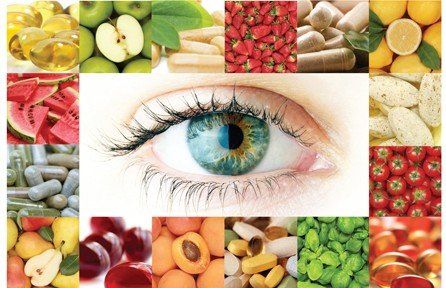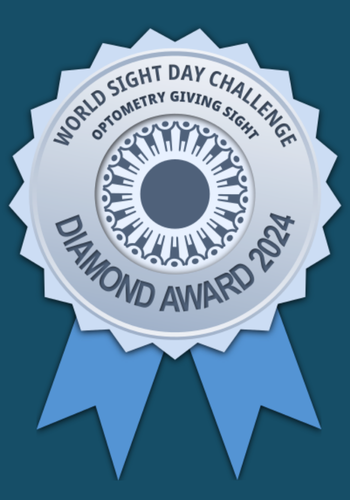NUTRITION FOR HEALTHY EYES

Updated July 2023
Growing evidence suggests that your eyes can benefit from good nutrition just as much as the rest of your body. Conversely, poor dietary choices or lack of certain elements in your daily calorie intake can put you at greater risk for vision problems and certain types of eye disease. For example, lack of Vitamin A is what causes many cases of childhood blindness in developing countries, due to lack of fresh produce, protein and animal/plant fats. Anti-oxidants such as Lutein and Zeaxanthin have been proven to be beneficial in preventing vision loss in macular degeneration and cataracts, two of the most common eye diseases. And intake of Omega-3 Essential fatty acids helps to prevent dry eyes and may also help prevent macular degeneration.
Recommended Food Guideline for your Eyes
So what do you do to ensure you’re making the right choices for healthy eyes? Following is a sample guideline for foods to included on a regular basis to keep you seeing clearly:
- Vitamin C: Sweet peppers (Red or green), kale, strawberries, broccoli, oranges, cantaloupe
- Vitamin A: Cod liver oil, liver, carrots, sweet potatoes, butternut squash
- Vitamin E: Sunflower seeds, almonds, hazelnuts
- Lutein and Zeaxanthin: Spinach, kale, collard greens, most leafy green vegetables
- Bioflavinoids: Citrus fruits, cherries, grapes, plums
- Zinc: Oysters, red meat, nuts
- Omega 3 Essential Fatty Acids: Cold water fish (salmon, mackerel, sardines)
Avoid excessive Omega-6 and -9 fatty acids which are found in processed, refined and fried foods. These can pose a problem if out of balance to Omega-3 intake and may lead to increased risk for macular degeneration as well as heart disease, cancer, arthritis, asthma and depression. Choose fresh produce whenever possible, but if not possible try to use frozen instead of canned (the canning process tends to decrease the availability of certain vitamins).
Let’s discuss the diet factor. The so-called “anti-oxidant foods” primarily found in dark green leafy vegetables (eg. Spinach, kale, broccoli) and fruits (berries are the best) contain key nutrients that are research-proven to fight AMD. A follow up study, with results due later this year, is expected to show that omega 3 fatty acids, found in fish, are also beneficial.
I always counsel my patients that it’s best to get these nutrients naturally, as part of a healthy diet. Most become anxious when we start discussing the recommended daily doses – 8 to 12 servings of fruits and vegetables daily, plus at least 2 servings of cold water fish per week. It’s true that it’s challenging to get this amount, and if we really analyzed our diets I think we’d see that many of us aren’t even coming close.
Advice from your Calgary Eye Doctor:
Don’t worry too much about the numbers. A serving is actually quite small. Strive to eat a decent amount of fruits and vegetables with every meal, and choose wisely – not all are high in the key nutrients. Click here to access a list of the best anti-oxidant foods to reduce progression of AMD. With the omega 3’s it is hard to get good sources of cold water fish regularly. There are vegetable-based omega 3 sources also, but we’d have to consume mountains of them in order to get the same benefit from a serving of good quality salmon, for example.
Your optometrist may make specific recommendations for diet and vitamin intake if your exam results reveal risks for certain eye conditions.
List of the nutrients most commonly associated with healthy eyes and good vision.
Lutein and Zeaxanthin
There is evidence that these nutrients can help prevent vision loss in people with certain forms of macular degeneration – one of the most common causes of vision loss among people aged 65 and over. They are found in leafy dark greens such as kale, spinach, squash and collard greens. People who are exposed to blue light from computer screens may also benefit from the protective effect of these nutrients. (also see “Important Information about Vitamins for Macular Degeneration” in this newsletter)
Vitamin C
Also beneficial for macular degeneration as well as cataracts, Vitamin C is found in peppers, strawberries, broccoli, oranges and cantaloupe.
Omega 3
Sources of omega 3 include fish like mackerel, sardines and anchovies and some vegetable-based foods like flax seed and walnut. Our doctors prescribe omega 3 fatty acids to help with dry eye disease and there may be a benefit in macular degeneration as well (also see other article in this newsletter “All Omega 3’s are not created equal”).
Beta Carotene and Vitamin A
There is evidence that these nutrients help protect the cornea’s surface, lessening the risk of Dry Eye Disease, and reducing infections and inflammations of the cornea. A decreased risk of macular degeneration has also been associated with Vitamin A intake – food sources are beef or chicken liver, eggs, butter and milk. Beta carotene (from vegetable sources such as carrots, sweet potatoes, spinach, kale and cantaloupes) also helps boost up the eye’s ability to protect itself from blue-light exposure from heavy computer screen use.
Vitamin D
We produce vitamin D naturally by exposure to sunlight – obviously in short supply during the winter months in Alberta! Food sources for vitamin D include cold water fish, milk and fruit juices (often fortified with vitamin D). There is some evidence that vitamin D may help promote healthy cellular metabolism leading to reduced risk for age-related eye diseases.
Vitamin E
Found in foods such as nuts and seeds, vitamin E can help lower chances of developing sight loss from eye disease when taken in combination with other anti-oxidant vitamins like lutein, zeaxanthin and vitamin C.
Zinc
Zinc was studied for its ability to help reduce the rate of vision loss from macular degeneration (AMD). It can be sourced in seafood, beef, and dark poultry meat. There are some considerations for zinc supplementation for those at risk for AMD – see relevant article also in this month’s newsletter (next).
We look forward to discussing specific questions you may have regarding nutrition and vitamins at your next eye care appointment.
With our best efforts it may still be challenging to get the right nutrition in our daily diet. Consider supplementing with vitamins – while not an excuse for eating poorly they can help “top us up” on those days we don’t quite get our daily levels of AMD-friendly foods. I recommend Macula 2 Essentials to help attain your anti-oxidant levels. It contains twice the amount of Lutein as the leading brands (Lutein is protective and is found in the macula). For the omega 3 I prescribe NutraSea liquid omega 3, 1.5 to 2 tsp daily. A big problem with many, if not most commercially available omega 3’s is that they absorb very poorly in the body and may actually be irritating to the stomach lining. NutraSea is a natural triglyceride which is specially formulated to be safe and readily bioavailable.
Reference: https://www.allaboutvision.com/nutrition/nutrition_summary.htm












